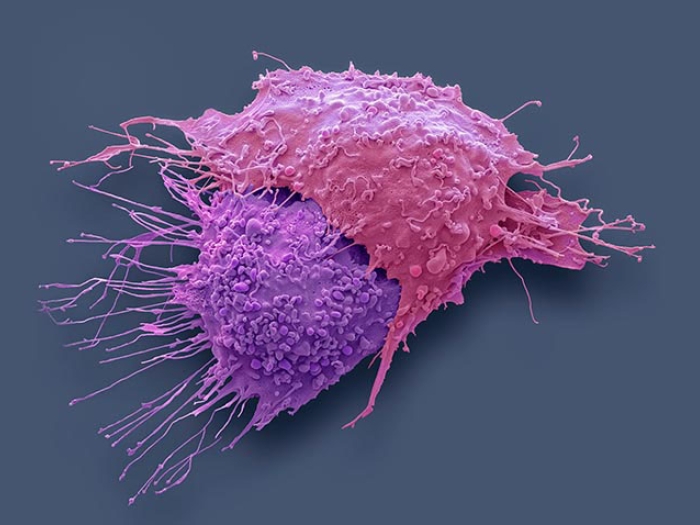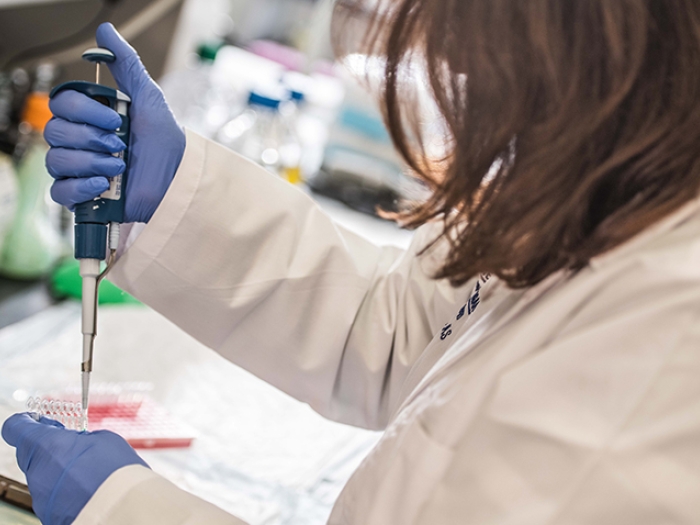The finding suggests a potential therapy to slow the disease in patients or a possible preventive strategy for women at high risk for ovarian cancer.
7:00 AM
Author |

Researchers have identified a protein that helps ovarian cancer cells multiply and spread. By blocking it with a new antibody agent, they could slow the cancer's growth and stop it from metastasizing.
MORE FROM THE LAB: Sign up for our weekly newsletter
The finding has potential to lead to a treatment to prevent or limit ovarian cancer in women at high risk.
The researchers examined EGFL6, a growth factor that drives cell growth and regulates stem cells. It's best known for its role in hair follicles. Researchers suspected it might also play a role in ovarian cancer stem cells.
When they triggered EGFL6 in ovarian cancer cells, it stimulated the cancer to grow two to three times faster. This held both in cell lines and in mice.
When researchers eliminated EGFL6, tumors grew very poorly, about four times more slowly. Results appear in Cancer Research.
… patients could be treated before cancer develops, potentially blocking cancer from developing or preventing it from spreading.Ronald J. Buckanovich, M.D., Ph.D.
Researchers found that EGFL6 acts specifically on cancer stem cells. Cancer stem cells are thought to fuel the growth and spread of cancer. They are often resistant to chemotherapy and radiation treatments.
Teaming with engineers, researchers used microfluidic chambers to look at how individual cells behaved. They found EGFL6 caused the cancer stem cells to divide asymmetrically — meaning the stem cell divided to form one new stem cell and a daughter cell with different characteristics.
This asymmetric division not only promotes tumor growth, but also creates cancer cell diversity.
SEE ALSO: Immune Cells Help Reverse Chemo Resistance in Ovarian Cancer
"What this means is that the stem cell population remains stable. But the daughter cells, which can have a burst of growth, multiply and allow the cancer to grow," says Ronald J. Buckanovich, M.D., Ph.D., a professor of hematology/oncology and gynecologic oncology at the University of Michigan Medical School.
But EGFL6 does not only promote proliferation.
Once again working with the engineers, the team demonstrated that EGFL6 promoted cancer stem cell migration. In addition, when EGFL6 was added to blood vessels, the cancer was more likely to metastasize.
When researchers treated mice with an EGFL6-blocking antibody, they saw a 35 percent reduction in the cancer stem cells and a significant reduction in tumor growth overall. The antibody also blocked the cancer from metastasizing.
Buckanovich suggests that this could be a potential therapy for women with stage 3 ovarian cancer — a way to control the disease by blocking the cancer's growth and spread.
"The bigger implication is for women at high risk of ovarian cancer," he says. "These patients could be treated before cancer develops, potentially blocking cancer from developing or preventing it from spreading. If cancer did develop, it could be diagnosed at an early stage, which would improve patient outcomes."
The researchers will next seek to convert the antibody into something appropriate for humans.

Explore a variety of healthcare news & stories by visiting the Health Lab home page for more articles.

Department of Communication at Michigan Medicine
Want top health & research news weekly? Sign up for Health Lab’s newsletters today!





